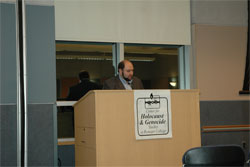- About Ramapo
- Academics
- Admissions & Aid
- Student Life
- Athletics
- Alumni
- Arts & Community
- Quick Links
- Apply
- Visit
- Give
New Book on Aftermath of Armenian Genocide Discussed
(PDF) (DOC) (JPG)October 7, 2010
 (MAHWAH, NJ) – Michael Bobelian, an acclaimed author, spoke at Ramapo College of New Jersey on October 7 under the auspices of the Center for Holocaust and Genocide Studies and the Armenian National Committee of New Jersey.
(MAHWAH, NJ) – Michael Bobelian, an acclaimed author, spoke at Ramapo College of New Jersey on October 7 under the auspices of the Center for Holocaust and Genocide Studies and the Armenian National Committee of New Jersey.
Bobelian spoke about his recent book, “Children of Armenia: a Forgotten Genocide and the Century-long Struggle for Justice.” Recently published by Simon and Schuster, it chronicles the aftermath of the aftermath of the Armenian Genocide, explaining how and why the Armenian Genocide disappeared from memory and uncovering, for the first time, the Armenian response to this tragic crime. In particular, it untangles the ongoing struggle between historic truth and geopolitical “pragmatism” of successive U.S. administrations.
As Bobelian pointed out, from the outset the sympathies of the American people were with the victims, and there was no doubt about who was responsible. The U.S. Ambassador Henry Morgenthau and other American diplomats as well as missionaries reported extensively on what they saw and heard on the ground. The unfolding tragedy of what was befalling the Armenians of Ottoman Turkey. Thanks to the reports of the New York Times and other newspapers, the American people were fully informed. Public support was mobilized and a massive fundraising effort was undertaken that spawned an extensive relief effort in the countries to which Armenian survivors were driven or fled. A paradigm of inaction in the face of Turkish intransigence was established that has lasted to the present day.
Yet, when the war was over, as Bobelian demonstrated, the U.S. and her allies failed to hold the perpetrators to account. The increasingly important role newly created Republic of Turkey as the gateway to the Middle East took precedence over the pursuit of justice. Realpolitik triumphed and philanthropic efforts assuaged popular guilt.
For the Armenian survivors of the Genocide, Bobelian emphasized, restarting their shattered lives was the order of the day. Lobbying the American or other governments to pressure the Turkish authorities to acknowledge the Genocide, punish the perpetrators or agree to pay reparations was not really on their agenda. They wanted to establish families, re-build their livelihoods, and revive communal life. They swallowed the pain of losing family and friends as well as property. Not even their children heard the horrors they experienced.
Michael Bobelian, a graduate of the Columbia Graduate School of Journalism, is a lawyer, journalist, and grandson of Genocide survivors. His work has appeared in Forbes.com, American Lawyer, and Legal Affairs magazine and featured on NPR’s Leonard Lopate show. In addition to having been a visiting professor at the American University of Armenia (2005), Michael Bobelian has held positions at the New York Law Journal (2003-2005) and the New York-based law firm of Hughes Hubbard & Reed LLP (1998-2002). He resides in New York City with his wife and daughter.
E-News Archives
| 2023 | 2022 | 2021 | 2019 | 2018 | 2017 | 2016 | 2015 | 2014 | 2013 | 2012 | 2011 | 2010 | 2009 | 2008 | 2007 |Copyright ©2025 Ramapo College Of New Jersey. Statements And Policies. Contact Webmaster.

Follow Us!